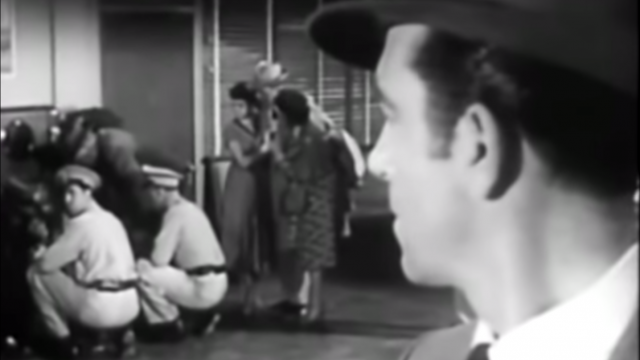This is an archetypal film noir. I don’t think of myself as someone well-versed in the genre, at least yet, but it fits with the idea of it I’ve built up with what I have seen – a stylised thriller in which a crime billows out into a city causing people to have to commit even more crimes. The thing that fascinates me about the genre is how much of it is based on dramatic principles – even when the story is about someone solving a mystery, more often than not the audience has the answer ahead of time (which is true here – we see Mr Big planning and executing the heist before we ever meet the patsy caught up in its wake) and we’re here to see people acting with limited information in ways that will come back on them. I suspect this is the influence of Alfred Hitchcock – even if these directors didn’t know about his basic principles of thriller filmmaking, they definitely picked them up from observation and put them into practice. What gets really interesting is the way this interacts with the motivation of the filmmaking; noir movies weren’t a deliberate cultural movement, they were a product churned out to make money. Kansas City Confidential was the twenty-second film by director Phil Karson, and was intended to be the first of thirteen pictures produced by the prolific Edward Small for Associated Players and Producers; nobody here had anything to prove or some grand statement to make, they just wanted to make a picture that would sell.
It’s worth comparing to the science fiction movies of the time, also motivated by money and also products churned out by the boatload, but to my eye much less artistically successful – I like watching them, but it’s always for the camp value and I don’t know if there’s any I would actually call a good movie, and there are almost none that have had a genuine lasting value the way films like this (or Detour, or The Hitch-Hiker) have. What gets me most are how similar the genres are in terms of acting and dialogue; boldly declarative, with every statement either a command or a moral judgement. The difference is the stories of noir almost force actors to deliver a consistent thought process underneath that; one of my favourite parts of KCC is how John Payne conveys his character’s resolve stiffening. It’s most obvious in his opening scenes, when he sheds his chaotic panic as he sees his options reduced to one simple path of revenge, but you can see it at different points throughout the film as he alternately panics and calculates. The scifi films are closer in structure to pornography, except you’re sitting through interminable dialogue to get to campy special effects instead of sex scenes; their value comes in the weird and wonderful ways they can kill time. It’s a distinction in nine-to-five working attitude comparable to Ronnie Gardocki vs Steve Billings – the noirs were trying to entertain an audience as efficiently as possible while the scifi films were trying to get in and out in an hour and change.

